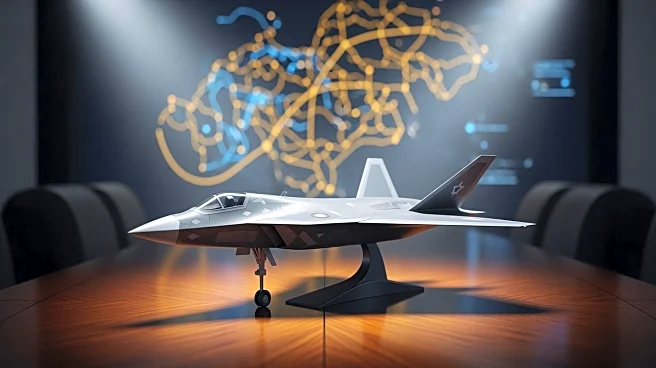What's Happening?
During the Dubai Airshow, significant developments in defense sales were discussed, including President Trump's approval of the F-35 sale to Saudi Arabia. This decision follows a long-standing interest
from Saudi Arabia in acquiring the advanced fighter jets, a process that has been ongoing for several months. The approval includes a package of defense sales, such as 300 tanks, and potentially other aircraft. The regional dynamics are complex, with the UAE having expressed interest in the F-35 since 2009, but facing delays due to geopolitical factors, including its relationship with China. The UAE's interest was further complicated by the Trump administration's approval of the sale in 2020, which was later rejected by President Biden due to concerns over UAE-China relations.
Why It's Important?
The approval of the F-35 sale to Saudi Arabia marks a significant shift in regional military capabilities and alliances. The F-35 is a highly advanced fighter jet, and its sale to Saudi Arabia could alter the balance of power in the Middle East. This move may strengthen Saudi Arabia's military position, potentially impacting its relations with neighboring countries and the broader geopolitical landscape. The decision also reflects the U.S.'s strategic interests in the region, balancing its relationships with Saudi Arabia and the UAE, while considering the implications of China's growing influence. The sale could lead to increased military cooperation between the U.S. and Saudi Arabia, affecting defense policies and regional security dynamics.
What's Next?
The sale of F-35s to Saudi Arabia is subject to approval by Congress, which could introduce further complexities. The delivery of the aircraft is expected to take several years, with Saudi pilots training in the U.S. before the jets are operational in Saudi Arabia. The UAE's response to being potentially sidelined in the F-35 acquisition process remains uncertain, and it may explore alternative options or strengthen ties with other defense partners. The broader implications for U.S. foreign policy and defense strategy in the Middle East will continue to evolve as these deals progress, with potential impacts on regional stability and international relations.
Beyond the Headlines
The sale of F-35s to Saudi Arabia raises ethical and strategic questions about arms sales and their impact on regional conflicts. The U.S.'s decision to proceed with the sale despite previous concerns highlights the complex interplay between economic interests, geopolitical strategy, and ethical considerations in defense policy. The long-term effects on regional security, including potential arms races and shifts in alliances, will be closely monitored by international observers. Additionally, the role of defense contractors and their influence on policy decisions may come under scrutiny as these deals unfold.









